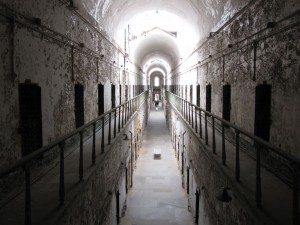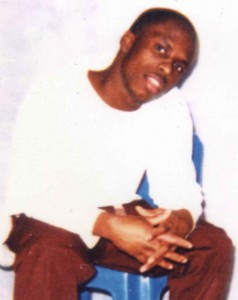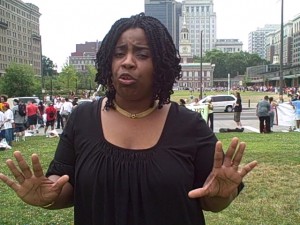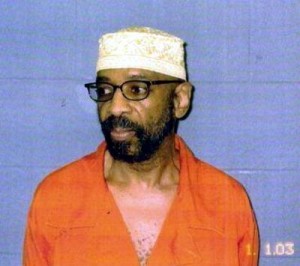Podcast: Play in new window | Download
Updates:
- NLG, CCR, EFF and Generations Ahead Say DNA Collection Violates Fourth Amendment
- Gang Injunction in Babylon, NY
- Durban 10 Coalition UN Meeting on Racism
—
Cruel Solitary Confinement In Pennsylvania Prisons
Earlier this year the National Lawyers Guild called on Superintendent Louis Folino to support the Program Review Board’s recommendation to release Russell Maroon Shoatz into the general prison population at SCI Greene in Waynesburg, Pennsylvania.
Jerome Coffey, a political prisoner currently being held in Pennsylvania’s SCI Forrest. Jerome’s social work while in prison include sending clothes to villages in Uganda and to women prisoners in the Philippines. That work has labeled him an instigator and he’s been placed in solitary confinement for more than 5 and a half years.
Bret Grote:
- The Human Rights Coalition was founded by state prisoners at the State Correctional Institution in Greene, Pennsylvania in 2000. The Pittsburgh chapter where I work was founded in 2006-2007.
- The main mission of the Human Rights Coalition was to bring the voices of the most excluded from criminal, legal, criminal justice discussions, namely those of prisoners, their family members and effected communities.
- We base our work in building relationships with prisoners and to bring support and advocacy to those most impacted by the prison system and that has led us straight into solitary confinements where people’s lives are being micro-managed down to the most minute details.
- The justifications for solitary confinement shift from to another, it used to be based on escapes. Now that Russell Maroon Shoatz is approaching his 70th birthday, they’re claiming its because of his past efforts of organizing hunger strikes, and they cite an incident where he was forced to defend himself against another prisoner.
- In Maroon’s case he met with a prisoner mental health staff person because there was some movement towards releasing him from solitary confinement that ended up being blocked.
- This staff person told him there was an allegation that he tried to organize an armed prison uprising in the 80’s. This has been following him around for over 25 years in his file, but he has not been able to challenge this because he was not informed of this at all.
- He is not represented by legal counsel. He is ripe for representation under the 8th amendment clause of cruel and unusual punishment.
- The prison authorities typical treatment for somebody who is the restrictive housing unit is a cursory interview at the cell, maybe once every 30 days with a staff worker, which is to say they’re not really giving them effective mental health treatment.
- You spend 23 hours in the cell, maybe 24 if the guards don’t take you to yard or shower.
- The things that one may witness on the whole are constant screaming, banging, and yelling and crying and cursing and talking to one’s self by prisoners who are psychologically disturbed. According to the figures up to 2500 or 3000 prisoners can be in solitary confinement on any given day in Pennsylvania. The total prisoner population in Pennsylvania is 52 thousand.
- We are constantly looking for serious and committed civil and human rights lawyers to work with us. We have a massive body of evidence. The solitary confinement system is an invisible system inside of a larger invisible system of the prisons.
Guest – Bret Grote, law student and volunteer with the Human Rights Coalition, an organization bringing the voices of the most excluded from criminal, legal, criminal justice discussions, namely those of prisoners, their family members and effected communities. The HRC works to build relationships with prisoners and bring support and advocacy to those most impacted by the prison system.
——
Andre Jacobs
Andre Jacobs is another Pennsylvania state prisoner in solitary confinement. Andre, a 27 year-old jailhouse lawyer, has been held in retaliatory solitary confinement for more than 8 years. In 2009, Andre was awarded 185 thousand dollars in a case against the Pennsylvania Department of Corrections, an action that has resulted in his being singled him out for abuse within the prison system. In January of this year, he was physically abused, issued death threats and denied medical treatment.
Liz Springer:
- It’s been rough, there had been days where I thought he wasn’t going to make it. I thought I was going to get a call saying he was dead. I send him inspiration cards, and support him, send him some Bible verses to keep him strong.
- There have been times he said to me, I can’t do it no longer, I can’t do it.
- They were beatin’ him in the court room. They said he had an attitude and when he was leaving the court room, I witnessed them beating him, and I said, “I love you Andre.” He turned around and said “I love you too.”
- They started beating him because they said he wasn’t supposed to speak to me.
- He lost that case because the guards got on the stand and said he hurt one of the guard’s wrist.
- He ended up with 18 years because of that. Lately he has a little hope.
- He was strapped to a chair for 12 hours not being able to move anything but his head. Didn’t eat, had to go the bathroom and he just went.
Guest – Liz Springer, activist and the grandmother of Andre Jacobs.
———
Russell Maroon Shoatz
As many listeners may know, former Black Panther Russell Shoatz has been in prison since 1972, and the past 21 of those years has been spent in solitary confinement. He’s 67, his spirit unbroken and in addition to his record of good conduct, members of the Pennsylvania Prison Society who visit Mr. Shoatz regularly attest to his peaceful disposition. Earlier this year the National Lawyers Guild called on Superintendent Louis Folino to support the Program Review Board’s recommendation to release Russell Maroon Shoatz into the general prison population at SCI Greene in Waynesburg, Pennsylvania. His daughter Theresa Shoatz joins us talk more about his advocacy work and life as a political prisoner.
Theresa Shoatz:
- The solitary confinement has had the worst effect on us. Within the 39 years we was able to have contact visits.
- The unit he’s in now, there’s no contact, you’re behind a glass when you visit.
- He’s had grandchildren since that time, and he hasn’t touched the grandchildren either. Our family is dedicated to visiting him, every 3 months.
- Russell Shoatz being known throughout the country. I notice now, his conversations are laid back, he’s not as upbeat as he used to be.
- He keeps stressing almost on our weekly calls, you gotta get me outta here.
- They told me Daddy’s a leader, I said no, he’s a grandfather. The Panthers didn’t say we want to battle the police. They said, we want to educate our youth, we want to feed them, we want to take control of our community. When it became war, and the Panthers were under attack, they said we got to protect ourselves.
- That’s what happened, and of course, Daddy’s a political prisoner. He took a stand and stood on the front line for his people and his community.
- I had a little attitude with him, I said why would you leave us, this was some years ago. He said, (I did it for my people. How could I allow you to be raised in that type of system?) It hit me like a ton of bricks.
- The guards, they called themselves the “wolfpack” when you’d see them comin, they would roll one pants leg all the up to the knee.
- I went to Governor’s office, the Governor of Pennsylvania. I was on trains, back and forth.
- It’s the same thing, when our people get in the streets and march, you really can’t do one march.
- At SCI Greene, over 20 young men in their 20’s hung themselves there (lynching) within a short time of solitary confinement.
- Daddy was constantly yelling to the guys, what to do. They come in strollin. Strollin down the solitary unit.
- This prison bubble is going to burst. There are people fighting on all levels, this prison bubble is going to burst.
- It’s going to end, we’re going to make sure of that.
Guest – Theresa Shoatz, daughter of political prisoner Russell Shoatz and activist with the Human Rights Coalition.
————————————————————





